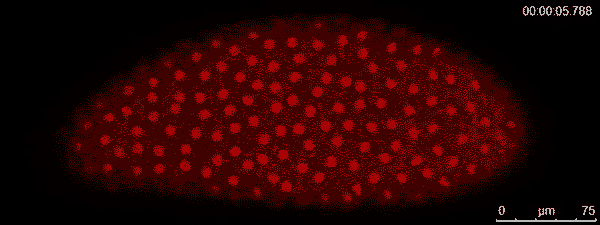 The dividing red spots in this time-lapse video belong to a busily developing fruit fly embryo. A fruit fly egg can divide into some 6,000 cells in just two hours — faster division than cancer tumors. To watch them action, graduate student Victoria Deneke and assistant professor Stefano Di Talia tagged the nuclei with a protein that glows red. In a recent study, they show that the cells coordinate their rapid divisions via waves of protein activity that spread across the embryo. The waves help ensure that all the cells enter the next stage of development at the same time.
The dividing red spots in this time-lapse video belong to a busily developing fruit fly embryo. A fruit fly egg can divide into some 6,000 cells in just two hours — faster division than cancer tumors. To watch them action, graduate student Victoria Deneke and assistant professor Stefano Di Talia tagged the nuclei with a protein that glows red. In a recent study, they show that the cells coordinate their rapid divisions via waves of protein activity that spread across the embryo. The waves help ensure that all the cells enter the next stage of development at the same time.

Duke graduate student Victoria Deneke has been awarded an international student research fellowship from the Howard Hughes Medical Institute.
Starting September 2016, Deneke became one of 20 graduate students from 14 countries selected for an international student research fellowship from the Howard Hughes Medical Institute.
Three-year fellowship is designed to support outstanding international graduate students studying in the United States who are ineligible for fellowships or training grants through U.S. federal agencies.
Born in El Salvador, Deneke earned her undergraduate degree in chemical engineering from the University of Notre Dame before joining Stefano Di Talia’s at Duke in 2013.
Fellows must be nominated by their institution; participation is by invitation only. Deneke is only the second student at Duke to receive an HHMI International Student Research Fellowship since the program was established in 2011.
CITATION: “Waves of Cdk1 Activity in S Phase Synchronize the Cell Cycle in Drosophila Embryos,” Victoria Deneke, Anna Melbinger, Massimo Vergassola and Stefano Di Talia. Developmental Cell, August 2016. http://dx.doi.org/10.1016/j.devcel.2016.07.023
